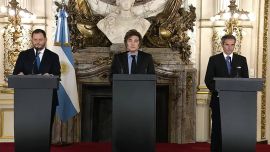Does Macri have an appealing narrative? Perhaps he does. Though what he and his backers have in mind is far more downto- earth than the melodramatic fantasy that was concocted by young Kirchnerites who saw themselves as epic heroes fighting evil in all its manifold forms, it could end up by capturing the imagination of millions of people who allowed themselves to be enthralled by distinct varieties of Peronism only to see their hopes dashed time and time again.
The fear that something like this could be about to happen has made Peronist leaders jittery. Their movement has always depended on making out that Argentina is the innocent victim of dastardly foreign imperialists, so their inability to deliver the goods promised by successive leaders was never really their fault. Until fairly recently, much of the population seemed to agree with them, but soon after Cristina Fernández de Kirchner got re-elected with a whopping 54 percent of the votes, many began to have second thoughts.
Four years after that remarkable triumph, such people expressed their doubts by voting against Daniel Scioli, Carlos Zannini, Aníbal Fernández and co, rather than for Macri and María Eugenia Vidal. However, there are signs that now they feel more warmly toward the country’s president and the provincial governor than they did when they were the only available alternatives to the unappealing characters Cristina had appointed to succeed her, either because she thought people would find them so awful they would soon start begging her to return, or because she wanted them to lose. She understood that, were Scioli to move into the presidency, he would do to her what Néstor Kirchner did to Eduardo Duhalde; once in power, the until then virtually unknown Patagonian quickly turned on his benefactor and cut him down to size.
As well as finding a new leader, the Peronists must come up with an updated version of their creed. Though the old one is still popular among the poorest of the poor, especially those who live in the decrepit shantytowns that surround Buenos Aires and other big cities, the coalition Macri leads is rapidly eating into such enclaves. With the help of opportunistic mayors, Cambiemos could soon take them over. Were that to happen, Peronism would at long last find itself consigned to the history books.
When preparing to take office, Macri insisted that he would give priority to the needs of the third or so of the population that is mired in poverty. At the time, few thought he was being sincere, but it seems he meant what he said and the message is gradually getting through to many who survive on hand-outs and odd jobs but would like something less demeaning. Should a majority of the poor come to trust both Macri and Vidal, Argentina’s political landscape would change as much as it did when Juan Domingo Perón, accompanied by Evita (Eva Perón), moved into the Pink House.
Some supporters of Macri, among them his chief guru Jaime Durán Barba, say he qualifies as a leftist because he wants to dismantle the corporatist order that has its roots in the old Spanish Empire and was consolidated by Perón. That is one way of looking at it, but Macri also has some preferences that, in Anglo-Saxon countries, would get him typecast as a conservative. He thinks people should stand on their own feet, worries about overspending and believes Argentina has it in her to play a significant role on the world stage not as the rebel country allied with Venezuela and Iran that Cristina wanted her to be but as an equal partner of the principal democratic powers.
The slogan Macri borrowed from Barack Obama, “Yes we can”, may be taken to mean that he believes Argentines should be perfectly capable of competing against all-comers instead of contenting themselves with sulking on the side-lines and complaining about the unfairness of it all. Whether or not this demanding “narrative” will catch on is an open question. No matter how politely government spokespeople put it, what they want is for everyone to do whatever it takes to make Argentina much more competitive in an increasingly unforgiving world in which also-rans cannot expect to be treated kindly. That will certainly be the case if China becomes as influential as some predict.
Many politicians, businessmen and trade union bosses think Macri is accusing them of not doing enough because they are too selfish and too wedded to the old ways. They are right, but they are far from being the only ones whose performance has been sub-par. After many decades of populist propaganda, much of the population remains convinced it is a victim of social injustice and therefore deserves to be given a break. Some governments – one was Raúl Alfonsín’s – refused to try and balance the budget for that very reason. Though in developed Western countries such an approach to life is currently fashionable among progressives – hence the loud wailing about the wickedness of “austerity” – Argentina’s unhappy experience should serve as a warning of what can happen to societies that surrender to collective self-pity.
(*) Former editor of the Buenos Aires Herald (1979-1986).























Comments